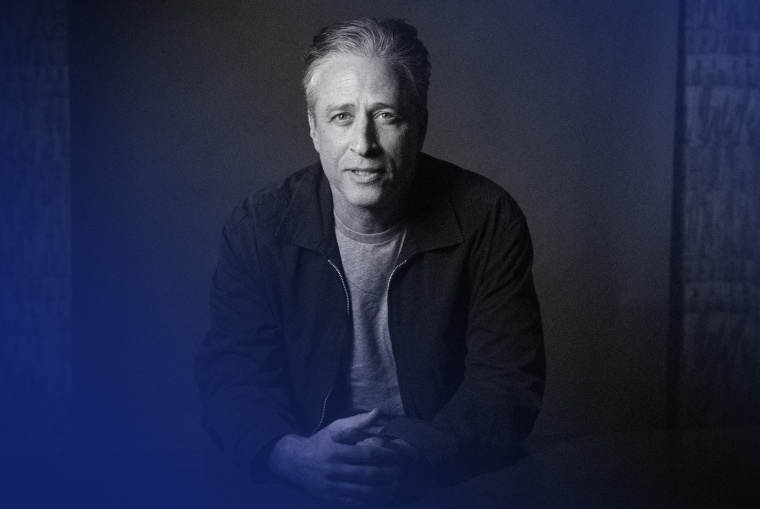“If only Jon Stewart was still hosting 'The Daily Show' during the 2016 campaign, Donald Trump would have never won!”
Stewart’s comedic barbs at Trump’s expense had already been shown to get under Trump’s thin skin.
In the months after the 2016 election, I can’t tell you how many times I heard or read the sentiment that Jon Stewart could somehow have saved us from Donald Trump becoming president. On Aug. 6, 2015, Stewart stepped down from his perch as host of the show that so many of us watched to make sense of the world. Seven weeks earlier, Trump had slithered down his golden escalator at Trump Tower to announce his run to essentially put the white back in the White House.
The thought that Stewart’s presence could have changed things makes some sense. It’s not just that he would have brutally mocked Trump during his candidacy, but it’s also that Stewart’s comedic barbs at Trump’s expense had already been shown to get under Trump’s thin skin. In 2013, in response to Stewart’s comedic jabs, Trump tweeted, “I promise you that I'm much smarter than Jonathan Leibowitz – I mean Jon Stewart.” Many people — including Stewart — rightfully believed Trump was trafficking in antisemitism by referring to Stewart’s given last name.
While Trump is out of the White House, it feels as though America is in more need of saving than ever in our lifetimes. Well, the good news is that Stewart is back! The Emmy Award-winning comedian just kicked off his new biweekly Apple TV+ show, “The Problem With Jon Stewart,” that, by its own description, aims to address problems plaguing our nation and to “discuss how we come up with change.”
The first episode gave us a taste of what we can expect. Stewart focused on U.S. military veterans who became gravely ill from breathing toxins emanating from “burn pits” the military set up outside their overseas bases to burn everything from garbage to human feces. "We support our troops, unless they actually need support," Stewart said as he featured veterans who said the government had turned its back on them after they’d risked their lives for the country.
Stewart has clearly set out to make a show that is not just funny but that also intentionally pushes for change. That’s evidence of Stewart’s evolution. When I interviewed him in 2011 for “The Muslims Are Coming!” — a comedy documentary I co-directed — Stewart said his comedy had resulted in no impact on the issues he wanted to see changed. I thought he was being humble, but when I pressed him, he ticked off topics he had addressed in his comedy — from media sensationalism to big money in politics — yet he had seen no real movement for the better.
Of course, Stewart had agreed to be interviewed for a documentary intended to use comedy to counter anti-Muslim bigotry. So he clearly understood that comedy — and the arts more generally — can play a role in activism. But he also understood that it takes more than jokes to change things.
Perhaps it was his frustration at not seeing tangible change arise from his comedy alone that inspired him to try his hand at more traditional activism on behalf of 9/11 first responders. In 2019, with funding running out for first responders who got sick after working near ground zero, Stewart testified before Congress and tore lawmakers a new one for not helping those who had shown such bravery. He also blitzed the media to draw attention to the issue. In the end, the bill passed, and billions of dollars were made available for victims through the next 10 years.
Stewart told The New York Times that the goal of his new show is not so much “advocacy as much as amplification.” He added: “That seems like a worthwhile use of the privilege of television.”
The first episode of Stewart’s show was a perfect example of that. Before that episode, I knew nothing about the medical ailments caused by burn pits or how poorly the government treats some of its veterans in need. As one veteran put it, apparently Veterans Affairs' motto is "Delay. Deny. Hope you die."
With funding running out for first responders who got sick after working near ground zero, Stewart testified before Congress and tore lawmakers a new one.
Amplification is the first step in advocacy. How can we hope people will engage in an issue, vote or push elected officials to do something if they don’t know about the issue? But, as Stewart learned, that alone won’t change things. It’s now up to me and others who were moved by it to join in more traditional activism to work for change.
We should hope going forward that Stewart will use the show and his comedy to amplify the dire nature of where we find our democracy. The goal should be much bigger than just defeating Trump in an election. We are faced with a Republican Party today that is defined by white nationalism and caters to religious extremists who want to turn these beliefs into law — all while they lead a war on our democracy.
No one person can save us from that. But having Stewart back to make us smarter while making us laugh about the issues confronting our country can play an important role in saving our nation. In the end, though, saving America is up to us.

